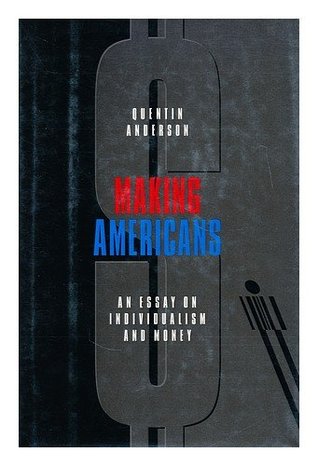John Dewey, Neil Coughlan thought, I was “the philosopher par excellence of American liberalism” because “he shared with it the root conviction that we can have both self-defined self-fulfillment and social justice for all.” This sunny picture of human nature can hardly be squared with modern or contemporary history. Nevertheless, as Quentin Anderson argues, the “historical fact appears to be that American intellectuals show a reluctance or inability to admit that any limitation of the goal of ‘self-fulfillment’ is implied by membership in the community.” So Dewey is one of Anderson’s targets in the present book.
In an earlier work of great distinction and continuing influence, The Imperial Self An Essay in American Literary and Cultural History, published in 1971, Anderson argued that fantasies of a transcendental, imperious, self-begotten, and self-created individuality were promoted with enduring effect by Emerson, Thoreau, and Whitman. Their post-Christian, post-moral, and antisocial project influenced and inspired a broad range of American artists and intellectuals, encouraging a pervasive “culture of Narcissism” that reemerged with radical force in the late I950’s and after in the self-referential “Beat” writers. Making Americans refines and applies this analysis by showing The Imperial Self‘s relation and reaction to the laissez faire capitalism that emerged in America in the quarter century before the Civil War, triumphed after it, and now dominates and characterizes our social milieu.
Anderson criticizes “the residual Marxism of American departments of literature in the 1990s” as well as the American Stalinists and fellow travelers of the 1930’s and 1940’s who were, in his view, a far worse evil than the capitalist country they inhabited, benefited from, and hated. Nevertheless, his critique of contemporary capitalist culture is devastatingly acute in its attack upon “the desiccating impersonality of economic relationships” and a “world suffused by the money network.”
Though he has written with distinction on George Eliot, Anderson’s main interest has been American literature, especially the work of Hawthorne, Melville, Emerson, Thoreau, Whitman, and Henry James. The Imperial Self and Making Americans both argue that the Romantic-Transcendentalist-aestheticist mode of Emerson, Thoreau, Whitman, and James encouraged and prepared the way for both a post-moral “visionary capitalism” and what at first sight seems its opposite, the existential, aesthetic self-absorption of the Beats and of the 60’s counterculture for which they prepared the way. Emerson, Thoreau, and Whitman “had in common,” he writes, “a pervasive undersong which was profoundly subversive” of ideas of family and society, of obligation and duty, of tradition, authority, and religion. Aesthetic visionaries such as Emerson had a procreative relation to the visionary capitalists of the Gilded Age, who also ignored traditional authority or held it in contempt. Great men make history, and Rockefeller, Gould, Vanderbilt, Fisk, and Carnegie were or saw themselves as such “great men.” (As Anderson points out, Nietzsche read and admired Emerson, not vice versa.)
The anarchic, radical voluntarism of Emerson, his friend Carlyle, and Nietzsche helped destroy for their readers the credibility of theism, Christianity, and natural law, whose adherents were seen as timid, superstitious, or unmanly in the age of America’s Social Darwinist expansion. If “self-reliance is a sufficient virtue, comprehending all other virtues,” as Anderson’s teacher Mark Van Doren paraphrased Elmerson’s central contention, then ethical law can have no credibility or authority’ for the really “liberated” individual, whether he styles himself a “left” radical or a “right” libertarian. This view proposes or entails a “deification of the individual,” rooted in the “extravagant claims for the powers of the individual that we find in Emerson, Thoreau, and Whitman.” Left or right, the modern American often has an “Emersonian detachment from awareness of our conditioned state,” as well as a concomitant contempt for ethics. He lives in and promotes what C.S. Lewis called “a world of incessant autobiography.” Yet in the academy, now largely influenced by the Paris Deconstructionists, such radical voluntarism often shares the same cranial cavities with determinist ideas that deny any human agency or free will, seeing us all as puppets of gender, race, class, and an authoritarian “logocentrism,” a contradictory conjunction that Anderson opposes.
Though essentially a work of literary and cultural history. Making Americans is a tribute to the moral imagination. It is also a book written out of love and loyalty to our turbulent and tattered Republic.
[Making Americans: An Essay on Individualism and Money, by Quentin Anderson (New York: Harcourt Brace Jovanovich) 264 pp., $21.95]

Leave a Reply